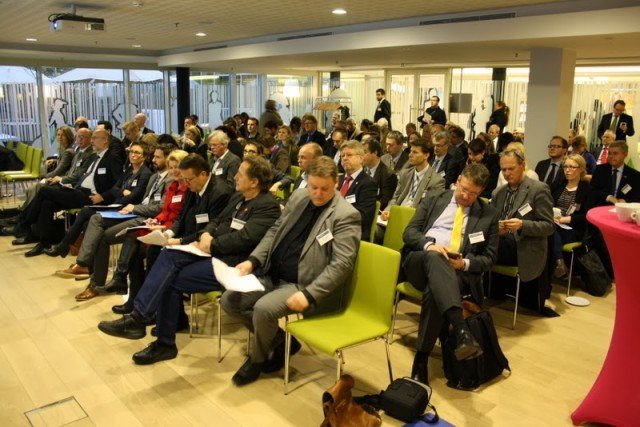Event Report: Humans in the Arctic

Photo: Torjus Kandal
On November 26, 2013 the North Norway European Office held a seminar on “Humans in the Arctic”, in collaboration with Arctic Frontiers 2014, The Arctic Institute and Maritimt Forum Nord. The seminar took place in conjunction with the annual conference Arctic Frontiers, to be held in Tromsø (Norway) from January 19th to 24th, 2014.
In two sessions, one on Growth and one on Governance and Cooperation “Humans in the Arctic” addressed the emerging environmental and social challenges as well as economic opportunities that arise from the continuous development of the European and in particular Norwegian Arctic. With the European Union and its institutions, and other European stakeholders from industry and research showing increasing interest towards these developments, the Norwegian North is a key area in bringing together old and new actors, and thereby fostering a sustainable future for the European Arctic.
More than 100 participants from politics, industry, research and academia paid careful attention to the introduction by Runar Sjåstad, County Mayor of Finnmark County and the two Members of the European Parliament, Jens Nilsson and Paul Rübig.
Anne Husebekk, rector from the University of Tromsø (UiT), introduced the 1st session and gave an overview on the increased global attention on Arctic development and its expected economic growth. The Tromsø High North Cluster can play a crucial role in providing the necessary knowledge for sustainable development in the Norwegian Arctic. In that regard Dan Tuppen, Vice President for Exploration, Barents Sea and Norwegian Sea from the energy company Statoil highlighted the potentials of the Barents Sea as a future source for European energy supply. However, Tuppen outlined the risks and long-term considerations attached to Arctic maritime drilling. With Arctic shipping often being perceived as the top-seller of Arctic economic development, Hanna Lee-Behrens, Director of the Department of Safety, Environment and Innovation from the Norwegian Shipowners’ Association, discussed related maritime opportunities and challenges in the High North.
In that regard she presented the report “High North – High Stakes. Maritime opportunities in the Arctic”, which draws on conclusions and data from a related report published by The Arctic Institute. As especially intra-Arctic shipping is expected to grow, Lee-Behrens emphasized the necessity of a mandatory Polar Code, currently developed by the International Maritime Organization (IMO) and its member states. In addition to maritime transport deliberations fishery plays a crucial role for economic considerations in the Barents Sea region. Trygve Myrvang, Managing Director from the Norwegian Fishermen’s Sales Organization, outlined questions on the sustainability of fish stocks in the Norwegian North.
In order to sustain the current success story Myrvang underlined the necessity of cooperation between the fishery and energy industry in the High North, both interested in the same offshore areas. Filip Hamro-Drotz from the European Economic and Social Committee (EESC) concluded the first session and critically assessed the interaction between civil society and businesses in the European Arctic. He urged the representatives from the European Arctic to particularly focus on their competitive advantage in the area and continuously stress their needed knowledge and skills.
The speakers in the 2nd session focused on on-going challenges concerning governance and cooperation especially with regard to the Arctic Council and the European Union’s related Arctic policy steps. Anne Kari Ovind, Deputy Director General of the Norwegian Ministry of Foreign Affairs, highlighted the official Norwegian perspectives of and approaches to fruitful cooperation in the Arctic. Nicola Payne, Second Secretary, Mission of Canada to the European Union, continued by outlining the Canadian goals set for its two-year Arctic Council chairmanship.
Additionally Mrs Payne emphasized several key elements of the recently agreed on EU-Canadian trade agreement as a platform to also bilaterally cooperate on circumpolar issues. Ole Kristian Bjerkemo, Chair of the Arctic Council’s Working Group on Emergency Prevention, Preparedness and Response (EPPR) gave an overview of the maritime cooperation efforts negotiated under the auspice of the Arctic Council, the Arctic Search and Rescue Agreement and the Agreement on Cooperation on Marine Oil Pollution Preparedness and Response in the Arctic. Matthew King, Head of Unit: Maritime policy, Atlantic, outermost regions and Arctic in the European Commission’s Directorate-General for Maritime Affairs and Fisheries, concluded the session. King advanced his opinion that the European Union has to (finally) activate its Arctic policy and related funds more effectively. Furthermore, the European Union should also seek to develop its Arctic policy ambitions outside the Arctic Council.
Final remarks were given by Ole Øvretveit, Conference Manager of Arctic Frontiers and Tomas Norvall, Chair of Nordland County Council and Board Member of the Norway European Office.
Arctic Frontiers 2014 under the theme “Humans in the Arctic” will focus on two main subject areas: 1) health, society and environment and 2) maritime operational challenges. The Arctic Institute, which will be represented by its members Malte Humpert, Kathrin Keil and Andreas Raspotnik, will host a side event on infrastructure related challenges in the Arctic.